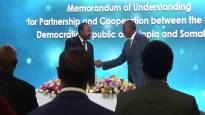Somalia’s government announced on Tuesday that it will invite Ethiopia’s ambassador to discuss a controversial port deal Ethiopia signed with Somaliland.
Ethiopia, a landlocked country in East Africa, will soon have access to the Red Sea.
Prime Minister of Ethiopia Abiy Ahmed and the President of Somaliland Muse Bihi Abdi signed the so-called memorandum of understanding on New Year’s Day in Addis Ababa, the capital of Ethiopia.
According to the preliminary agreement, Ethiopia will have access to the port of Berbera in the territory of Somaliland, which broke away from Somalia.
– In return, Ethiopia must in time recognize Somaliland as an independent state, Somaliland President Abdi said at the signing ceremony.
Abdi did not specify when Ethiopia should recognize Somaliland as independent.
Ethiopian Prime Minister Abiy Ahmed described the agreement as a significant diplomatic victory for Ethiopia.
The details of the agreement have not been made public
Ethiopia’s Security Adviser by Redwan Hussien According to the memorandum of understanding, Ethiopia will have access to the shores of the Red Sea, where Ethiopia can conduct commercial and military activities. Until now, Ethiopia has been allowed to use the port of Djibouti for the export and import needs of its industry.
In addition, the agreement gives Ethiopia access to a mercenary base in the Red Sea, Hussien wrote on social media.
In addition to the recognition of independence, according to the preliminary agreement, Somaliland would get a share of Ethiopia’s national airline, Ethiopian Airlines, Hussien said on Monday.
Somali government to emergency meeting
Although the memorandum of understanding signed by Somaliland and Ethiopia is not legally binding, the Somali government discussed the agreement in an emergency meeting on Tuesday.
Prime Minister of Somalia Hamza Abdi Barre accused Ethiopia of destabilizing East Africa and promised his country to defend its territories “with all the means allowed by law”, Somalia’s national broadcaster SNTV reported.
The Somali government also announced that it plans to summon Ethiopia’s ambassador to discuss the controversial port deal Ethiopia signed with Somaliland.
The self-governing Somaliland has not achieved international recognition, even though it seceded from Somalia already in 1991.
This happened shortly after Somalia’s president Mohamed Siad Barren the military government was ousted at the end of a long civil war.
Somaliland acts like an independent state, although it has not received the recognition of its independence from other countries. No African Union country or the UN recognizes Somaliland as an independent state.
Somalia’s Sonna news agency reported last week that after talks led by Djibouti, Somalia and Somaliland had decided to continue talks to resolve their mutual disputes.
The situation is intensifying in the region of the Horn of East Africa
In October, Ethiopian Prime Minister Abiy Ahmed described the difficult access to the Red Sea as an existential problem for his country.
The statement caused tensions throughout the Horn of Africa, as Ahmed’s words were feared to mean that Ethiopia would use the sea lanes to fight against its neighbor Eritrea.
Relations between Ethiopia and Eritrea are complicated.
Ethiopia lost access to its coastal area when Eritrea gained independence from Ethiopia in the early 1990s. Between 1998 and 2000, the two countries fought a bloody war, after which their relations were hostile for years.
In 2018, however, the countries signed a peace agreement.
In 2021, Eritrea became embroiled in an internal conflict in its neighboring country, where Ethiopian government forces have been fighting the Tigray People’s Liberation Front (TPLF). Eritrea has fought on the side of the Ethiopian government.
Sources: Reuters, AFP
